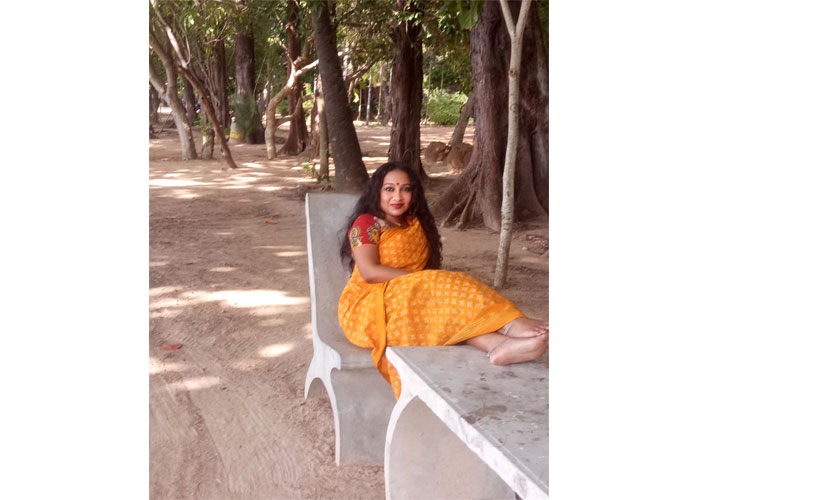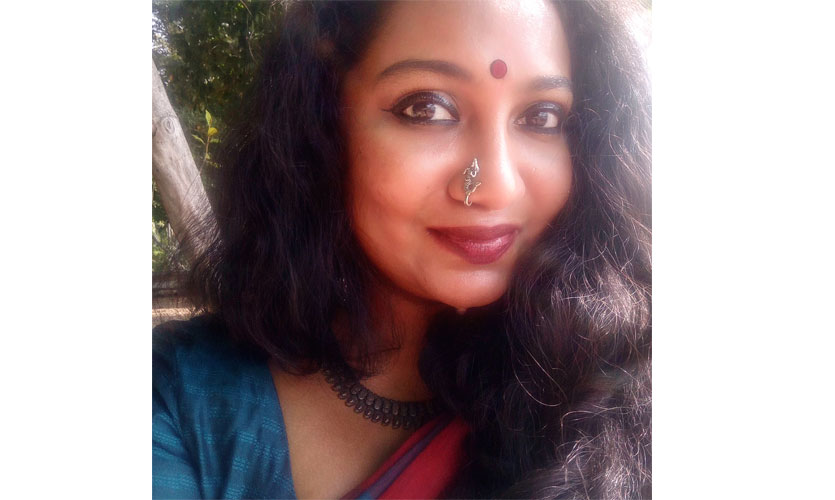Oct 24 2017.
views 911 When Sharanya Manivannan first cast her light into my life, I cupped her poems like water all in the name of salvation. Looking into each, crafted with power, what still lingers on the surface are incantations of the heart longing for love, and with that a strong longing to reap a sense of selfness. Manivannan ties together three countries to call ‘home’. Raised in Sri Lanka and Malaysia, she currently lives in Chennai writing in English.
When Sharanya Manivannan first cast her light into my life, I cupped her poems like water all in the name of salvation. Looking into each, crafted with power, what still lingers on the surface are incantations of the heart longing for love, and with that a strong longing to reap a sense of selfness. Manivannan ties together three countries to call ‘home’. Raised in Sri Lanka and Malaysia, she currently lives in Chennai writing in English.

We caught up with the author following her brief visit to Sri Lanka, to chat about her first work of fiction, upcoming projects, Sri Lankan lineage, censorship in India and more.
Your stories sometimes emerge like the erotic sculptures at Khajuraho; glorifying shamanism whilst also contemplating grief with desires thundering against the heat of monsooned lyricism. But your career started out with poetry. How did this happen?
I’ve never felt a contradiction between poetry and prose. I see them as intertwined streams. So I work in both genres, and more, depending on what calls to me at any time.
Any plans for Tamil translations of ‘The High Priestess Never Marries’? If so, how might the conservative Madras react if exposed to your written works in the Tamil language? Do you think there will be some form of intolerance?
At the moment, no translations are in the works. When I first moved to India, ten years ago, I was quite afraid of this particular kind of attack. Contemporary women poets working in Tamil, including Salma, Kutti Revathi, Malathi Maitri and others, were subjected to rape and death threats for writing about women’s empowerment, desire and freedom.
These days I’m more afraid of what all open-minded people have become afraid of. It is no longer moral policing that is our chief threat. One needs only to look at the murder of outspoken people like Gauri Lankesh and what was done to the author Perumal Murugan to see why.
In the story “Greed And The Gandhi Quartet” you speak of “living with intensity, feeling everything.” How do you think such philosophies shape a world that is redemptive enough to astonish us of being alive after loss?
Numbness and indifference are kinds of pain too, and many people choose these over deep engagement, immersion and attachment.But life leaves no one unscathed. So while we can, I believe we must always choose meaning. Often, the world offers redemption: but we must also be willing to receive it.
You identify yourself as a Sri Lankan Tamil residing in South India. Upon reading “Conchology” I encounter the Sri Lankan mermaid who bemoans a Fisher King. So, certain elements beckon me to establish a connection with your folklore and the fishing crisis?
I’m a Sri Lankan Tamil who grew up in Malaysia, who holds an Indian passport and has lived in Chennai for ten years. Each of these specifics is a facet of my experience. The folklore of fishing communities has been an area of interest to me for a long time, and began in fact with encountering the oppari singers (professional female mourners) shortly after I moved to Chennai. (Before that, forever and always, the sea filled my emptied places). It was not till later that I discovered a personal connection, how Batticaloa (my maternal hometown) was settled by fisherpeople from Kerala and Tamil Nadu a thousand or more years ago. I was 27 when I went to Batticaloa for the first time, and I was struck by the mermaid motif everywhere. When I was a child, my mother had told me about the mermaid in the lagoon who sings on full moon nights, and in adulthood I asked the question: how can a mythical figure exist around whom no folklore seems to have developed? This pursuit is at the centre of the graphic novel I’m currently writing and illustrating. At the bedrock of all my writing is the premise of silences.
Does Sri Lanka haunt you like a man or a country you once left behind? What lures you to keep coming back?
Colombo was the first home of my life, and leaving Sri Lanka at five years old emblazoned a mark on me I was aware of through all my growing years. Although there were a few visits in the interim, like many diasporic people my relationship to the place itself, independent of nostalgic and family connections, was strained. I recognised this and made a conscious effort to correct this. Over the course of three trips in the past one year, I built an adult’s sense of orientation to Colombo and Batticaloa. It took a great deal of honesty with myself, because taking the risk of forming something tangible means one may lose that sense of nostalgia altogether. I’m deeply fortunate to have that tangible bond now. I treated this act of building as I would any relationship: by moving slowly, by taking nothing for granted, and by always trying to be kind.
As with publishing your first book, can you speak about why you say, “literary work sells very poorly in India"?
My first book, a collection of poetry entitled Witchcraft, was published in 2008. My fourth book, a collection of poetry entitled ‘The Altar of the Only World’, is forthcoming at the end of 2017. In between these were the short story collection, ‘The High Priestess Never Marries’, and the children’s picture book, ‘The Ammuchi Puchi.’ I’m keen to demystify the glamour of publication, because I think this glamour does a disservice to writers. The available statistics speak for themselves about English language literary publishing in India. Like almost every author I know, I can’t live off my royalties. That means we continue having “day jobs” that pay the bills. This is why book piracy is especially egregious. And why readers who buy books, recommend them and actively support a reading culture are so important.
Your book points at shards keen on fulfilling your decision to build alone or rather dare I say, remain single. As a woman now in your 30s, are you content with where this choice is taking you?
I began to write ‘The High Priestess Never Marries’ when I saw that I would have to begin building alone. I was in my mid-20s then, the fulcrum at which, for many women, life takes on a very definite sense of restriction, darkened by the fear of loneliness and the choices made or decisions accepted as a result. I speak, obviously, of the institution of marriage, which is inherently patriarchal. Personally, the problem was that I rejected the institution but longed for partnership. And I could not see enough paradigms of fulfilling lives that took similar trajectories. So I began to write the stories in order to find answers to some of my own questions, or at least to complicate available perspectives. I also wrote, as I have done since childhood, to console myself. I am now 32 years old. Every day, I try to keep in mind what I am building and why. The loneliness doesn’t go away. But everything mindfully lived becomes meaningful. I love fiercely and always will: and what I want to bring forth in my work is how love isn’t about another individual, but about the self, stories, about compassion, the divine, the world. About trees, seas, laughter and dogs with liquid eyes. About courage. You used the word “shards” in your question, which is perceptive. I move through the world with a heart so broken it has become many hearts.
0 Comments